
The ABA House of Delegates convened Feb. 5 in Louisville, Kentucky, and approved a new policy against laws that limit teaching about race or gender. The new policy also opposes bans on books that cover those subjects.
It specifically expressed opposition to any attempt by governmental entities to restrict the teaching, inclusion of studies or access to resources on the “experiences, roles and contributions” of any individual or group on the basis of such areas as gender, race and ethnicity.

The delegates also approved nearly 30 other measures that include requiring free-speech policies for the nation’s law schools, encouraging written policies for the removal of prosecutors for misconduct and urging governmental entities to follow federal reporting guidelines related to deaths in criminal custody situations.
Resolution 505 cited Florida’s 2022 Stop Woke Act, which included measures prohibiting teachers from discussing matters related to race, color, national origin or sex, effectively curtailing any discussion of slavery and marginalization in American history.
In Texas, an appointee of the governor put the brakes on American Indian/Native studies courses. In South Carolina, a bill that would limit certain teachings on race in public schools and allow parents to challenge educational materials is moving through the state’s House of Representatives.
The ABA resolution, said Darcee Siegel of Florida, “fights back against the dismantling of public education.”
The law school free speech standard spelled out under Resolution 300 establishes Standard 208 for the nation’s 196 law schools now accredited by the Council of the ABA Section of Legal Education and Admissions to the Bar, which serves as an independent arm of the ABA for the approval of law schools.
The new standard requires schools to adopt a policy that would allow faculty, students and staff “to communicate ideas that may be controversial or unpopular, including through robust debate, demonstrations or protests,” and would forbid activities that disrupt or impinge on free speech.
Law school faculty have long enjoyed protections for academic freedom, but the new standard is the first to address free speech for the entire law school community.
The move follows student protests at Stanford Law School and Yale Law School, which disrupted controversial conservative speakers and comes amid campus tensions in the aftermath of the conflict in the Middle East, which began with Hamas’ attack on Israel on Oct. 7, 2023.
Other new ABA policies approved by the delegates include:
• Resolution 501 affirms the essential role of prosecutorial discretion and independence in the criminal justice process and would prevent the removal, suspension or substitution of elected prosecutors for personal or partisan reasons or without due process.
In Florida, an elected former prosecutor was ousted by the governor allegedly for statements he signed in support of transgender care and abortion rights. In January, a federal appeals court allowed his suit against the governor to proceed.
• Resolution 508 asks all educational authorities to establish and implement policies that recognize that all students, including transgender, gender-nonconforming and nonbinary students, have a reasonable and protected expectation of privacy when determining how and with whom to share information about their gender identity.
• Resolution 506 urges governmental entities to follow the federal Death in Custody Reporting Act and ensure that there is an independent investigation into the cause of any death that occurs in a correctional institution or in the custody of law enforcement.
• Resolution 604 asks Congress to pass legislation to establish a President’s Award for Civic Engagement to reward and recognize students in grades 5-12 who display outstanding civic leadership and leadership in their communities. It also urges the U.S. Department of Education to establish national criteria for the award.
• Resolution 703 approves the Uniform Collaborative Law Rules and Uniform Collaborative Law Act that provides an additional tool in the alternative dispute resolution toolbox.
While a similar measure failed in the HoD more than a decade ago, the approach has been adopted by 23 jurisdictions nationally and the voluntary concept is more generally accepted today.
The final House of Delegates meeting in 2024 is planned for early August in Chicago.
Alan Pickert is a partner at the Terrell Hogan law firm and a past president of the Jacksonville Bar Association.